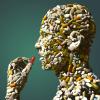Role of folate in methylation of dUMP to TMP: (full access link)
http://www.jneurosci...28/28/7219.fullThe mechanisms by which chronic folate deficiency adversely affects CNS function are incompletely understood. Folic acid plays an essential role in one-carbon metabolism: it is required both in the remethylation of homocysteine to methionine and in the synthesis of
S-adenosyl-methionine, the principal biological methyl donor in numerous methylation reactions. Reduced DNA methylation during folate deficiency results in altered gene expression and thereby may disrupt genome integrity (
Bergman and Mostoslavsky, 1998). Dietary folate also has a major impact on homocysteine levels, which may exert direct neurotoxic and pro-oxidative actions (
Lipton et al., 1997;
Kruman et al., 2000;
Ho et al., 2003) with an inverse relationship between plasma folate and homocysteine concentrations (
Selhub et al., 1993).
Importantly, the methylation of deoxyuridine monophosphate (dUMP) to thymidylate (TMP) requires folic acid. Under conditions of folate depletion, a block in the methylation of dUMP to TMP increases intracellular deoxyuridine triphosphate (dUTP) by several orders of magnitude while concomitantly deoxythymidine triphosphate (dTTP) levels drop (
Goulian et al., 1980b). Furthermore, a deficiency in folate has been reported to lead to an increase in genome instability (
Beetstra et al., 2005), possibly the result of uracil misincorporation into DNA in proliferating cells and the subsequent formation of A:U mismatches. In addition, spontaneous hydrolytic deamination of cytosine both in proliferating and in differentiated cells also results in erroneous uracil residues in the form of U:G mispairs (
Barnes and Lindahl, 2004). Base excision repair replaces these uracil bases (
Friedberg et al., 2006). Uracil-DNA
N-glycosylase (UNG) is the most widely distributed glycosylase that removes uracil from single- as well as double-stranded DNA (
Kavli et al., 2002). We have previously demonstrated that UNG is of major importance for brain tissue repair after transient brain ischemia (
Endres et al., 2004,
2005).
Here, we tested the hypothesis that neuronal dysfunction induced by chronic folate deficiency is aggravated in the absence of efficient uracil excision repair. We demonstrate significant alterations on the molecular, neurochemical, histological, and behavioral levels with distinct interactions between
Ung genotype and folate deficiency
Granted, this refers to neurogenesis in the foetus, but it's not a long stretch to include a process that increases neurogenesis in adults:
http://jn.nutrition....6/1162.abstractIn mice, maternal dietary folate, a cofactor in 1-carbon metabolism, modulates neurogenesis and apoptosis in the fetal brain. Similarly, maternal dietary choline, an important methyl-donor, also influences these processes. Choline and folate are metabolically interrelated, and we determined whether choline supplementation could reverse the effects of folate deficiency on brain development. Timed-pregnant mice were fed control (CT), folate-deficient (FD), or folate-deficient, choline-supplemented (FDCS) AIN-76 diets from d 11 to 17 (E11–17) of pregnancy, and on E17, fetal brains were collected for analysis. Compared with the CT group, the FD group had fewer neural progenitor cells undergoing mitosis in the ventricular zones of the developing mouse brain septum (47%;
P < 0.01), hippocampus (29%;
P < 0.01), striatum (34%;
P < 0.01), and anterior and mid-posterior neocortex (33% in both areas;
P < 0.01). In addition, compared with CT, the FD diet almost doubled the rate of apoptosis in the fetal septum and hippocampus (
P < 0.01). In the FDCS group, the mitosis rates generally were intermediate between those of the CT and FD groups; mitosis rates in the septum and striatum were significantly greater compared with the FD group and were significantly lower than in the CT group only in the septum and neocortex. In the FDCS group, the hippocampal apoptosis rate was significantly lower than in the FD group (
P < 0.01) and was the same as in the CT group. In the septum, the apotosis rate in the FDCS group was intermediate between the CT and FD groups' rates. These results suggest that neural progenitor cells in fetal forebrain are sensitive to maternal dietary folate during late gestation and that choline supplementation can modify some, but not all, of these effects.
Particularly when you read this:
http://journals.lww....of_adult.5.aspx Folate deficiency inhibits proliferation of adult hippocampal progenitorsNeurogenesis in the adult hippocampus may play important roles in learning and memory, and in recovery from injury. As recent findings suggest, the perturbance of homocysteine/folate or one-carbon metabolism can adversely affect both the developing and the adult brain, and increase the risk of neural tube defects and Alzheimer's disease. We report that dietary folic acid deficiency dramatically increased blood homocysteine levels and significantly reduced the number of proliferating cells in the dentate gyrus of the hippocampus in adult mice.
In vitro, the perturbance of one-carbon metabolism repressed proliferation of cultured embryonic multipotent neuroepithelial progenitor cells and affected cell cycle distribution.
Our results suggest that dietary folate deficiency inhibits proliferation of neuronal progenitor cells in the adult brain and thereby affects neurogenesis.So..Feel free to correct me if I'm wrong, but, I'm fairly confident that folate levels will be depleted by neurogenesis in general and that folate deficiency during neurogenesis leads to DNA transcription errors. We know that uridine uprates neurogenesis, as per previous papers on this thread.
Therefore, increased neurogenesis = increased requirement for folate = increased requirement for B12 .. unless I'm missing something, here?















































